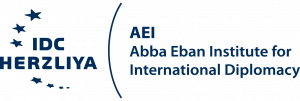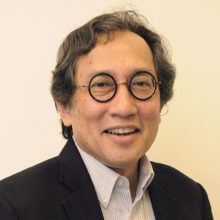
- 20 Apr 2021
Singapore and Israel: Navigating the Technological Superpower Competition
 |
 |
This event is jointly organised by the Abba Eban Institute at the Interdisciplinary Center Herzliya
& the Middle East Institute at the National University of Singapore.
Abstract
Cutting-edge technologies and innovative capabilities are becoming increasingly essential in determining the superpower race and defining the future position and role of smaller states.
Innovative leaders such as Singapore and Israel, have to increase cooperation and develop joint strategies to prepare for a geopolitical landscape that seems to be growing more uncertain and divided. Leading the race of artificial intelligence, semiconductors, 5/6G, satellite communication and other technologies will prepare both countries significantly better in balancing between the superpowers. In light of growing trends such as decoupling or attempts at self-reliance, countries have to assess their capabilities and build long-term strategies.
In this special event led by the Middle East Institute (NUS) and the Abba Eban Institute for International Diplomacy (AEI), we will expand on the different challenges and opportunities faced by Middle Eastern countries in the technological sphere.
This public talk will be conducted online via Zoom on Tuesday, 20 April 2021, from 2.00pm to 3.30pm (Singapore Time) / 9.00am to 10.30am (Israel Time). All are welcome to participate. This event is free, however, registration is compulsory. Successful registrants will receive a confirmation email with the Zoom details closer to the date of the event.
This event is free, however, registration is compulsory. For the latest event programme, please click HERE.
Photo by Michael Dziedzic on Unsplash
Listen to the full event here:
Watch the full event here:
Read the Summary of Event Proceedings:
By Fauzan A. Roslee
Research Associate, Middle East Institute, National University of Singapore
US-China Relations and Their Technological Advancements
MEI Chairman Bilahari Kausikan kicked off the event by delivering a preface to the panel discussion. In his remarks, Mr Bilahari outlined three main points: First, the Biden administration is not going to fundamentally change the Trump administration’s approach towards China as there is a bipartisan consensus in the US on being tough with China. Equally, Beijing does not seem to want to change the trajectory of its relationship with the US either as it does not want to look weak.
Second, the Biden administration has made clear that it wants to work closely with American allies and partners. However, Mr Bilahari cautioned that while his administration is less hostile than Trump’s towards multilateral institutions and international laws, one should not assume that American policymakers will instinctively enlist them as the first preference, as the American attitude towards multilateralism and international rules has always been ambivalent across many administrations for a very long time.
Third, in order for countries to position themselves to their best advantage, they should understand clearly the nature of US-China competition. War is highly improbable owing to nuclear deterrence because it will keep the peace between the US and China – as what had happened during the Cold War. However, this does not mean that US-China competition is the “new Cold War”; US-China competition is not about one system replacing another but about dominance over a single common. Most crucially, the US, China and all other economies that collectively make up the single global system are bound together by and enmeshed within a web of supply chains over scope, density and complexity never before seen in history. This makes it very improbable that either the US or China will be able to entirely disentangle themselves from this dense and intricate web of supply chains.
On Small States and Gaining Technological Edge
Ambassador Ron Prosor of the Abba Eban Institute then delivered his opening remarks, in which he concurred with Mr Bilahari’s observation on the present state of US-China relations. Mr Prosor likened the two superpowers to aircraft carriers which small boats (read: countries) will have to expertly navigate their way around. The idea is how small countries can really influence what is happening in our region. He highlighted that the shift towards Iran under the Biden administration has huge effects as it could affect the security interests of individual countries around the Middle East.
Mr Prosor also remarked that since the Abraham Accords, Gulf countries have embarked on a significant paradigm shift whereby they view Israel as part of the solution to peace in the region.
For a small state like Israel, that is navigating its axis between the US and China, it chooses not to side with either of the two superpowers as that would allow it flexibility in protecting its national interests. While the Israel is the US’ natural ally, China has increasingly played an important role in the Middle East through trade, investments and vaccine diplomacy, especially after it signed a 25-year partnership with Iran.
Mr Prosor then reiterated that while small states like Israel and Singapore can rely on their allies for support, they are also expected to be able to take care of themselves in matters of national security. This is especially important with the ongoing intensive competition for technological superiority among many countries. As such, Mr Prosor concluded that small states should not only strive for qualitative military edge but increasingly for technological edge as well, by exploring avenues to build strategic partnerships with global technological hubs like the US and UK.
Legal Challenges in Artificial Intelligence
Professor Simon Chesterman began the panel discussion by raising the question of technological opportunities of the digital revolution. He believes that while both Israel and Singapore are poised to take advantage of the digital revolution to advance their technological edge, both countries confront a challenge as the global technological space is dominated by major players. For example, the European Union (EU) has played a major role in setting global norms in areas like data protection and regulation of artificial intelligence (AI), while the US and China have played key roles in advancing technological capacities. In contrast to the EU’s human rights-led approach, the US is very much market-dominated with technological companies leading the way; whereas China is very much a state-interest or a sovereignty model through the idea of a fragmented internet and data localisation provisions that it imposes on its own population which would undermine much of the opportunity for globalisation and integration.
Moving forward, Prof Chesterman provided some projections on certain e legal issues that we might confront in the future. One of the challenges that we face as machines become faster, opaquer and more autonomous is, to work out who is responsible for the decisions that they take and whether there is indeed an argument that at some point in the future they might deserve personality. He maintained that it is important to ask these questions from a legal standpoint so that blame can be pinned on the right party when things go wrong.
Prof Chesterman also posed the question on how we can shape or constrain behaviour if a super intelligence emerges. He proposed that in the case where an autonomous vehicle crashes into someone, the victim could sue the supposed driver for negligence, or the manufacturer if the vehicle blows up. At the same time, in the extreme case of an AI takeover, there could be real dangers of misalignment of values where a machine, for example, is so powerful that it might interpret the instructions it was programmed with as the primary obstacle to its autonomy and that it could one day be turned off by humans. Hence, its first motivation would be to make sure that never happens. To prevent that, one method would be to control AI by ensuring that there is a switch to turn it off but an alternative approach is to think about whether there are ways in which we can align its values with ours.
Small States and Navigating the Superpowers
Dr Gedaliah Afterman remarked that as competition between the US and China is becoming increasingly focused on technology and innovation, it seems that both superpowers have reached the conclusion that technological supremacy will play the decisive role in determining the outcome of the superpower rates. The US, under President Biden, aims to contain China’s technological ascent while building its own technological leadership despite a shift in tone in many areas by the Biden administration. With regard to China and particularly on technology, the current administration is containing Trump’s line but is taking a more systematic approach. This new reality is placing many smaller countries in a new and unfamiliar position having to navigate and promote their own interests while balancing the demands of the two competing superpowers.
He then describes some of the challenges and opportunities that “middle powers” face in the current dynamics, given that both superpowers rely on middle powers to help give them an advantage in critical areas. As Singapore and Israel have positioned themselves as global innovation hubs, more Chinese companies have begun to set up bases in both countries. This has prompted the US to pressure Israel into regulating and limiting its engagement with China on key technological issues. Taking all this into account, what insights can be gained by smaller countries?
The first is that technological and economic decoupling are not good for small and middle countries; middle countries must work to avoid choosing sides or being in a position of needing to make a choice. Instead, they should work together to reinforce the open globalised system to create new avenues and frameworks for co-operation with other important powers such as India, Japan and South Korea. Hence, it is important to keep in mind that the current state of superpower competition can also create opportunities for middle countries to renegotiate their positions vis-à-vis the superpowers: What do they get in return for deciding one way or another and what can the superpowers give in return for small powers’ support or lack of support for the other side?
The Digital Silk Road and the US Security Necessity
Dr Alessandro Arduino then proceeded to elucidate about the Digital Silk Road and how countries from the Middle East and East Asia are looking to balance Chinese digital ecosystem with US security necessity, as well as technological prospects in the near future. While 5G is an important component of the Digital Silk Road, at its core, is big data which has been a very important component of the AI race between the superpowers today and, of course, the expansion of the Digital Silk Road from Middle East to East Asia is going to give China an important advantage.
However, how are the Middle East and East Asia going to balance between the two superpowers?
As the other speakers have mentioned, by not making any decision is a strategic decision in and of itself. Countries today, from the Gulf to Indonesia and Singapore are not quite keen in choosing sides. For instance, as China is interested in Israeli technology, Israel has no choice but to balance this economic entanglement with China with security necessity as outlined by the US, through the Clean Network initiative. Similarly, in South Korea, which is one of the biggest suppliers of microchips to China, it stands with the US on the necessary security measures to protect data and privacy. However, Iran, which is linked directly to the Chinese economic and technological ecosystem, does not have to engage in the balancing act between the two superpowers.
The worst-case scenario in these situations is that a country could be in a difficult position of having to choose between two digital ecosystems which could result in a bifurcation. That would mean different supply chains and not being able to buy microchips, as well as different regulation standards.
Employing Technology for Security Purposes
Mr Daniel Cohen then shared how a superpower should navigate around the competition among big tech companies. He related how, in the last couple of years, AI and big data are being increasingly used by countries and independent actors for monitoring, reporting and detecting terrorism.
Mr Cohen explained that online open-source research can be used to understand terrorism as social media plays a critical role in shaping the identity and perceptions of many of the terrorist attacks in the last couple of years. In general, social media and insight messaging platforms offer interaction and engagement and they act as enablers of influence without any centralised leadership or organisational infrastructure. All in all, the internet lends alternative sources of legitimacy to traditional sources of authority and plays a key role in the dynamic process of radicalisation. As such, by using AI today, we may just predict probable events that could be imminent in the future.
For instance, in the case of terrorist attacks in Israel between 2015 and 2017, there are many common denominators such that many of the attackers were young – some were under 18 years old – single, not affiliated with any established terrorist organisations and most of them do not have any record of suspicious or criminal activities before. This means that the motivation in many of these cases came from online incitement from social media platforms. By using big data analytics and AI, security agencies would be able to look out for the patterns and common denominators of a possible terrorist attack by making a list of potential attackers and alerting families or parents to monitor their young ones online and offline.
Another example is how the US Cyber Command had deleted ISIS battlefield videos from the internet, which was done in collaboration with tech companies. However, at times, the US Cyber Command have also done it by themselves – destroying computer networks and servers through malware. Mr Cohen then concluded that despite criticism of privacy invasion, there is a need for governments to leverage on big data and AI to protect against any form of attack. On the other hand, the civil sector and academics can also provide guidelines to navigate around the ethical questions surrounding this.
About the Speakers

Chairman
Middle East Insitute,NUS
Ambassador Ron Prosor
Head
Abba Eban Institute of International Diplomacy (AEI)
Professor Simon Chesterman
Dean
Faculty of Law
National University of Singapore (NUS)
Dr Gedaliah Afterman
Head, Asia Policy Program, AEI
Dr Alessandro Arduino
Principal Research Fellow
Middle East Institute (NUS)
Daniel Cohen
Head, Technology and Diplomacy Program, AEI
Mr Bilahari Kausikan is the chairman of the Middle East Institute, an autonomous institute of the National University of Singapore. Mr Kausikan was permanent secretary of Singapore’s Ministry of Foreign Affairs from 2010 to 2013, having served as second permanent secretary since 2001. He was subsequently ambassador-at-large until May 2018. His earlier appointments at the ministry include deputy secretary for South-east Asia, permanent representative to the United Nations in New York, and ambassador to the Russian Federation.

Prior to joining the IDC, Ambassador Prosor served as Israel’s 16th Permanent Representative to the United Nations (UN) from 2011-2015.
In his three decades with the Ministry of Foreign Affairs, Mr Prosor carved out an international reputation as one of Israel’s most distinguished diplomats. Between 2004 and 2007, he served as the Director General of the Ministry of Foreign Affairs, overseeing Israel’s 2005 disengagement from Gaza and leading the diplomatic campaign to declare January 27th as the International Holocaust Memorial Day.
Subsequently, Mr Prosor spent four years as Israel’s Ambassador to the United Kingdom, where he earned plaudits for his articulate and forthright defence of Israel’s position, publishing numerous articles throughout the British press and addressing the widest possible range of audiences throughout the country.
During his term as Israel’s Ambassador to the UN, Mr Prosor held the position of Vice President of the General Assembly (GA). He chaired the GA’s first debate on anti-Semitism and oversaw the passing of major resolutions,

Professor Simon Chesterman is dean of the Faculty of Law at the National University of Singapore. He is also editor of the Asian Journal of International Law. Educated in Melbourne, Beijing, Amsterdam and Oxford, Professor Chesterman’s teaching experience included stints at University of Melbourne, University of Oxford, University of Southampton, Columbia University and Sciences Po. Between 2006 and 2011, he was global professor and director of the New York University (NYU) School of Law’s Singapore programme.
Prior to joining NYU, he was a senior associate at the International Peace Academy and director of UN Relations at the International Crisis Group in New York. He has worked for the UN Office for the Coordination of Humanitarian Affairs in Yugoslavia and interned at the International Criminal Tribunal for Rwanda.
Professor Chesterman is the author or editor of 17 books, including Law and Practice of the United Nations (with Ian Johnstone and David M Malone, Oxford University Press, 2016); One Nation Under Surveillance (Oxford University Press, 2011); You, The People (Oxford University Press, 2004); and Just War or Just Peace? (Oxford University Press, 2001). He is a recognised authority on international law, whose work has opened up new areas of research on conceptions of public authority — including the rules and institutions of global governance, state-building and post-conflict reconstruction, the changing role of intelligence agencies, and the emerging role of artificial intelligence and big data. He also writes on legal education and higher education more generally.

Dr Gedaliah Afterman has 13 years of experience in International Relations, Asian Regional Security and Chinese Foreign Policy, Business and Culture.
His previous roles include serving as a diplomat at the Australian Embassy in Beijing; International Strategic Policy Specialist at the Australian Department of Foreign Affairs (DFAT); Research Fellow at the International Institute for Peace Research (PRIO) in Oslo; and Fellow and China Programme Lead at the Jewish People Policy Institute (JPPI) in Jerusalem.
Dr Gedaliah holds a B.A. in Philosophy from the Hebrew University of Jerusalem and a PhD from The University of Melbourne.

Dr Alessandro Arduino is the Principal Research Fellow at the Middle East Institute, National University of Singapore. He is the co-director of the Security & Crisis Management International Centre at the Shanghai Academy of Social Science (SASS-Polito) and an external associate at Lau China Institute, King’s College London. His two decades of experience in China encompasses security analysis and crisis management. His main research interests include China, Central Asia, Middle East and North Africa relations, sovereign wealth funds, private military/security companies and China’s security and foreign policy.

Daniel Cohen is a cyber security and policy expert with a demonstrated history of working in the public policy sector.
He is a Research Fellow at the International Institute for Counter-Terrorism (ICT) at the IDC Herzliya and a Senior Researcher at the Blavatnik Interdisciplinary Cyber Research Center (ICRC) and the Yuval Ne’eman Workshop for Science, Technology and Security at Tel Aviv University.
His research fields include cybersecurity and cyber terrorism, focusing on the use of web and social media by terror organisations; influence operations and counter-terrorism. He is skilled in cyber strategies, cyber intelligence, counter terrorism, analytical skills, government, entrepreneurship and market analysis.




